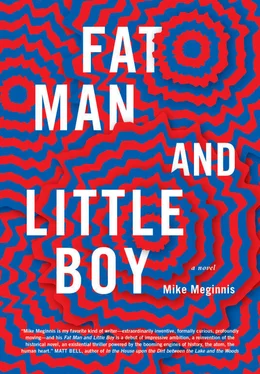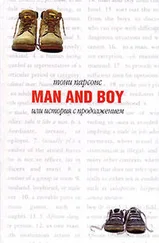He finds a French history of flight and sits to read. It begins with the French contributions to the field, focusing on these at the expense of the Germans, Italians, Americans, and Japanese. One of the small pleasures of the languages of others is witnessing their petty nationalisms. He finds himself laughing at a paragraph lauding the craftsmanship, care, and elegance found in French plane designs as a way of downplaying the innovations of foreign engineers. He runs his hand over an illustration of a particularly tasteful aircraft, all soft curves and stylish bulges, tracing its wings and fuselage, imagining how each segment might look disembodied, exploded. The beauty of a machine’s destruction is a ratio of its beauty intact.
The young, new wife sits down beside him. She says, her voice thick with sleep deprivation, “My father designed those, and helped to build them.”
“Where’s your handsome husband?” says Masumi.
“He’s ill in the cabin. I’ve been caring for him but I needed a break. You should hear him going on about his stomach.” Her own stomach burbles. The medium notices a pale, waxy quality to her skin. A zit crowns her nose, obviously much-molested, red and furious against her pallor. He watches the girl raise her thumb and rub it over the pus nub, which whitens and then crimsons again as she applies and releases the pressure, the way a thumbnail does when pressed.
“Are you sure that you aren’t ill as well?”
“I mustn’t be, the way he whines,” she says, offering a lazy wink. “If I’m sick then he’s dying, so I’ve decided I’m not sick.”
“Very prudent.”
She takes a handkerchief from the elastic waistband of her skirt and blows her nose, folds the fabric to cover her crime. She looks longingly at a portrait of an engineer—thick glasses fallen to the tip of his nose, wild lick of hair an island on an otherwise bare, long forehead, gentle eyes. With the ginger half-aggression of a young bride, she touches the page, bringing her soft elbow into soft contact with Masumi’s gut, and in intimate proximity to the butt of his fancy little gun.
“Do you miss him?” says Masumi.
“I loved my mother more while he was alive. Now he’s gone and we eat and sleep on his fortune, luxuriating in this quaint little hideaway, waiting for the letter demanding that we come home and stop wasting the money to which my mother feels she is entitled. But the truth is the rent here is very reasonable. We should have chosen, perhaps, a more frivolous hotel.”
“So you do miss him, and you need to burn a little money.”
She nods, taking the book from his hands.
“My wife can help you with that.”
“You’re married?” says the newlywed. “What does she look like? Is she very beautiful?”
“She’s a Japanese woman,” says Masumi, as if that is an answer. “She looks a bit like me, I’m told.”
“How come I’ve never seen her here before?”
“She doesn’t like to come out in the daytime. It would darken her skin, which is very fair, and concerning which she is also very vain. Also, she is uncomfortable in groups. She would be comfortable with you though. I can tell.”
The newlyweds don’t come to dinner. Matthew is sent to their cabin with a large platter of easily-digested foods: breads, jellies, fruit, steamed vegetables.
John raves, not for the first time, about the film they saw the week before. His enthusiasm fades to background noise, but certain themes and phrases assert themselves repeatedly—repetitions, no less, from other meals and conversations, wherein the fat man also touched his neighbors freely on their arms and wrists to emphasize his points and better capture their attention. “They’re really brilliant kids,” he says. “Handsome, of course, but both so talented and—and this is the really special part—both exactly equal in their talents. You understand? Neither one has anything over the other, or if he does, I couldn’t spot it.”
“Yes,” says Rosie. “They were pretty good.”
“Their genius lies in being identical, or alternately, in appearing to be identical,” says John. “Now, it’s possible this is only an illusion. Perhaps they’ve divided the emotional spectrum between them. Able, for example, might be responsible for sadness, disappointment, misery, loneliness, and the sort of joy that makes one weep. Baker would then be charged with savagery, anger, joy, laughter, humor, exuberance, and orgasm.”
“You don’t film orgasm,” says Rosie. “People don’t want to see that.”
Masumi toys with his salmon. Lemon butter sauce drizzled over the pink meat, seasoned with crumbled herbs, fork tender. He sips the wine he brought to the table, the wine he is sharing; the widow takes a sip as well, as does Mrs. Dryden. Matthew comes back from the newlyweds’ cabin empty-handed, rubbing his stomach, ready to chow . He sits down across the table from the fat man, serves himself fish from the pile at the table’s center, dripping citrus-laced dairy fat on the tablecloth in a trail of yellowed dots. There is still a little steam rising from his meal. Rosie covers the fish again and piles vegetables onto his plate as if she were his mother, neither making eye contact.
John drones on. “It might be that they’ve taken a more disorganized approach, with Baker doing all the scenes requiring tears, anger, giddiness, and jealousy, while Able claims hunger, fear, intimacy, and sadism, to name some possibilities. Or it might be that Able is responsible for the full range of emotion apart from those that require expelling fluids: weeping, spitting, ejaculation, bleeding, drooling, urination, and so on.”
“People don’t want to see those things,” says Rosie, “or hear about them.”
“They’re artists ahead of their time. Someday people will film all of those things and more.”
“Why should they want to do that, John?” says Masumi.
“People are curious about their bodies.” He looks down at his plate: empty, eaten, in spite of all his rambling. “They want to know what it’s like for other people.”
“About the same, I imagine,” says Rosie. She dabs at her cheek with a napkin.
“Imagine two men,” says John, pushing through to his central point, “brothers, dividing the human experience between them, to make it manageable. Each masters his share of human feeling and leaves the rest to his twin. Together, their efforts make one man, perfect and round as an unbroken circle.”
The young bride knocks at Masumi’s door. He knows it is her because of how she knocks—her knuckles striking twice, firmly, and then nothing. The shifting of skirts outside as she sways, considering, imagining. These are the ways that she would do these things.
The medium welcomes her in.
“You are beautiful,” says the bride, perhaps a little too surprised, touching the kimono, pinching the silk. “I love your robe.”
“Thank you,” says Masumi.
He’s let his hair down. He wears a touch of makeup. He’s left the peacock feather needles in their bundle, apart from the one that extends from his third eye. The rest seemed a bit much for close quarters.
“Where’s your husband?” asks the bride.
The medium explains Masumi’s gone out walking. This way they have their privacy. They discuss payment. The young bride passes the medium a fair chunk of her dead father’s money—the high price of a personal consultation. They sit together at the medium’s table, her simple wooden box between them, but closer to the medium’s chair so it is clear the bride should not touch.
“I’m told you’d like to speak with your father.”
“You can do that?”
“I can be a vessel. If you want me to.”
Читать дальше












